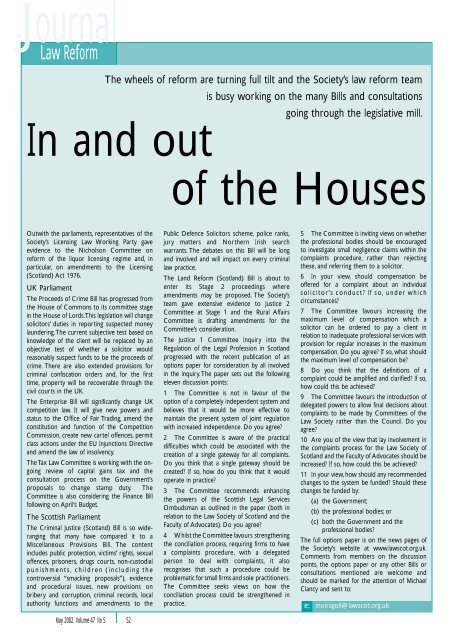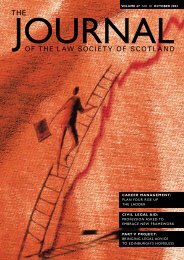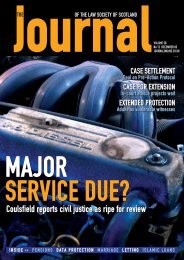OF THE LAW SOCIETY OF SCOTLAND - The Journal Online
OF THE LAW SOCIETY OF SCOTLAND - The Journal Online
OF THE LAW SOCIETY OF SCOTLAND - The Journal Online
Create successful ePaper yourself
Turn your PDF publications into a flip-book with our unique Google optimized e-Paper software.
<strong>Journal</strong><br />
Law Reform<br />
In and out<br />
of the Houses<br />
Outwith the parliaments, representatives of the<br />
Society’s Licensing Law Working Party gave<br />
evidence to the Nicholson Committee on<br />
reform of the liquor licensing regime and, in<br />
particular, on amendments to the Licensing<br />
(Scotland) Act 1976.<br />
UK Parliament<br />
<strong>The</strong> Proceeds of Crime Bill has progressed from<br />
the House of Commons to its committee stage<br />
in the House of Lords.This legislation will change<br />
solicitors’ duties in reporting suspected money<br />
laundering.<strong>The</strong> current subjective test based on<br />
knowledge of the client will be replaced by an<br />
objective test of whether a solicitor would<br />
reasonably suspect funds to be the proceeds of<br />
crime. <strong>The</strong>re are also extended provisions for<br />
criminal confiscation orders and, for the first<br />
time, property will be recoverable through the<br />
civil courts in the UK.<br />
<strong>The</strong> Enterprise Bill will significantly change UK<br />
competition law. It will give new powers and<br />
status to the Office of Fair Trading, amend the<br />
constitution and function of the Competition<br />
Commission, create new cartel offences, permit<br />
class actions under the EU Injunctions Directive<br />
and amend the law of insolvency.<br />
<strong>The</strong> Tax Law Committee is working with the ongoing<br />
review of capital gains tax and the<br />
consultation process on the Government’s<br />
proposals to change stamp duty. <strong>The</strong><br />
Committee is also considering the Finance Bill<br />
following on April’s Budget.<br />
<strong>The</strong> Scottish Parliament<br />
<strong>The</strong> Criminal Justice (Scotland) Bill is so wideranging<br />
that many have compared it to a<br />
Miscellaneous Provisions Bill. <strong>The</strong> content<br />
includes public protection, victims’ rights, sexual<br />
offences, prisoners, drugs courts, non-custodial<br />
punishments, children (including the<br />
controversial “smacking proposals”), evidence<br />
and procedural issues, new provisions on<br />
bribery and corruption, criminal records, local<br />
authority functions and amendments to the<br />
May 2002 Volume 47 No 5 52<br />
<strong>The</strong> wheels of reform are turning full tilt and the Society’s law reform team<br />
is busy working on the many Bills and consultations<br />
going through the legislative mill.<br />
Public Defence Solicitors scheme, police ranks,<br />
jury matters and Northern Irish search<br />
warrants. <strong>The</strong> debates on this Bill will be long<br />
and involved and will impact on every criminal<br />
law practice.<br />
<strong>The</strong> Land Reform (Scotland) Bill is about to<br />
enter its Stage 2 proceedings where<br />
amendments may be proposed. <strong>The</strong> Society’s<br />
team gave extensive evidence to Justice 2<br />
Committee at Stage 1 and the Rural Affairs<br />
Committee is drafting amendments for the<br />
Committee’s consideration.<br />
<strong>The</strong> Justice 1 Committee Inquiry into the<br />
Regulation of the Legal Profession in Scotland<br />
progressed with the recent publication of an<br />
options paper for consideration by all involved<br />
in the inquiry. <strong>The</strong> paper sets out the following<br />
eleven discussion points:<br />
1 <strong>The</strong> Committee is not in favour of the<br />
option of a completely independent system and<br />
believes that it would be more effective to<br />
maintain the present system of joint regulation<br />
with increased independence. Do you agree?<br />
2 <strong>The</strong> Committee is aware of the practical<br />
difficulties which could be associated with the<br />
creation of a single gateway for all complaints.<br />
Do you think that a single gateway should be<br />
created? If so, how do you think that it would<br />
operate in practice?<br />
3 <strong>The</strong> Committee recommends enhancing<br />
the powers of the Scottish Legal Services<br />
Ombudsman as outlined in the paper (both in<br />
relation to the Law Society of Scotland and the<br />
Faculty of Advocates). Do you agree?<br />
4 Whilst the Committee favours strengthening<br />
the conciliation process, requiring firms to have<br />
a complaints procedure, with a delegated<br />
person to deal with complaints, it also<br />
recognises that such a procedure could be<br />
problematic for small firms and sole practitioners.<br />
<strong>The</strong> Committee seeks views on how the<br />
conciliation process could be strengthened in<br />
practice.<br />
5 <strong>The</strong> Committee is inviting views on whether<br />
the professional bodies should be encouraged<br />
to investigate small negligence claims within the<br />
complaints procedure, rather than rejecting<br />
these, and referring them to a solicitor.<br />
6 In your view, should compensation be<br />
offered for a complaint about an individual<br />
solicitor’s conduct? If so, under which<br />
circumstances?<br />
7 <strong>The</strong> Committee favours increasing the<br />
maximum level of compensation which a<br />
solicitor can be ordered to pay a client in<br />
relation to inadequate professional services with<br />
provision for regular increases in the maximum<br />
compensation. Do you agree? If so, what should<br />
the maximum level of compensation be?<br />
8 Do you think that the definitions of a<br />
complaint could be amplified and clarified? If so,<br />
how could this be achieved?<br />
9 <strong>The</strong> Committee favours the introduction of<br />
delegated powers to allow final decisions about<br />
complaints to be made by Committees of the<br />
Law Society rather than the Council. Do you<br />
agree?<br />
10 Are you of the view that lay involvement in<br />
the complaints process for the Law Society of<br />
Scotland and the Faculty of Advocates should be<br />
increased? If so, how could this be achieved?<br />
11 In your view, how should any recommended<br />
changes to the system be funded? Should these<br />
changes be funded by:<br />
(a) the Government;<br />
(b) the professional bodies; or<br />
(c) both the Government and the<br />
professional bodies?<br />
<strong>The</strong> full options paper is on the news pages of<br />
the Society’s website at www.lawscot.org.uk.<br />
Comments from members on the discussion<br />
points, the options paper or any other Bills or<br />
consultations mentioned are welcome and<br />
should be marked for the attention of Michael<br />
Clancy and sent to:<br />
e:<br />
moiragoll@lawscot.org.uk










